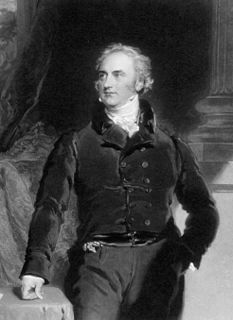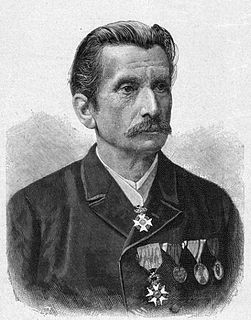A Quote by Henry Parry Liddon
Let us think today of the prospect of sharing in a sublime and blessed existence such as is portrayed in the text of the Apocalypse before us, and let us ask ourselves whether it should or should not make any difference in our present state of being.
Related Quotes
A sacred pride should grip us of not being satisfied with the mediocre but to strive (for we can do it, if we want to) with the exertion of all our strength to attain the highest. Let us scorn what is of this earth, let us ignore what is of heaven, let us leave absolutely everything worldly behind us in order to hasten to the abode out of this world, in the proximity of the sublime deity. We do not need to think of stepping back. Of being satisfied with second rank, let us strive for dignity and glory. To attain the highest.
The question we must ask ourselves as a culture is whether we want to embrace the change that must come, or resist it. Are we so attached to the dietary fallacies with which we were raised, so afraid to counter the arbitrary laws of eating taught to us in childhood by our misinformed parents, that we cannot alter the course they set us on, even if it leads to our own ruin? Does the prospect of standing apart or encounttering ridicule scare us even from saving ourselves?
The Americans say that we are ungrateful-but I ask them for heaven's sake, what should we be grateful to them for-for murdering our fathers and mothers?-Or do they wish us to return thanks to them for chaining and handcuffing us, branding us, cramming fire down our throats, or for keeping us in slavery, and beating us nearly or quite to death to make us work in ignorance and miseries, to support them and their families. They certainly think we are a gang of fools.
Demons frighten us because we set ourselves up to be frightened. We are overly attached to our reputations and possessions. When we love and desire what we should be rejecting, we are in conflict with our true selves. That's when the negative energies catch us and use our weapons against us. Instead of taking up what we have to defend ourselves, we put our swords in the hands of our enemies and make them attack us.
It is the Paraclete Spirit, the "Comforter", who grants us the courage to take to the streets of the world, bringing the Gospel! The Holy Spirit makes us look to the horizon and drive us to the very outskirts of existence in order to proclaim life in Jesus Christ. Let us ask ourselves: do we tend to stay closed in on ourselves, on our group, or do we let the Holy Spirit open us to mission?
Most of us don't have mothers who blazed a trail for us--at least, not all the way. Coming of age before or during the inception of the women's movement, whether as working parents or homemakers, whether married or divorced, our mothers faced conundrums--what should they be? how should they act?--that became our uncertainties.
Let us pause before the Child of Bethlehem. Let us allow our hearts to be touched, let us allow ourselves to be warmed by the tenderness of God; we need his caress. God is full of love: to him be praise and glory forever! God is peace: let us ask him to help us to be peacemakers each day, in our life, in our families, in our cities and nations, in the whole world. Let us allow ourselves to be moved by God's goodness.
To recognize our bias toward error should teach us modesty and reflection, and to forgive it should help us avoid the inhumanity of thinking we ourselves are not as fallible as those who, in any instance, seem most at fault. Science can give us knowledge, but it cannot give us wisdom. Nor can religion, until it puts aside nonsense and distraction and becomes itself again.
We see ourselves in other people’s eyes. It’s the nature of the human race; we are a species of reflection, hungry for it in every facet of our existence. Maybe that’s why vampires seem so monstrous to us—they cast no reflection. Parents, if they’re good ones, reflect the wonder of our existence and the success we can become. Friends, well chosen, show us pretty pictures of ourselves, and encourage us to grow into them. The Beast shows us the very worst in ourselves and makes us know it’s true .
Love knows no virtue, no profit; it loves and forgives and suffers everything, because it must. It is not our judgment that leads us; it is neither the advantages nor the faults which we discover, that make us abandon ourselves, or that repel us. It is a sweet, soft, enigmatic power that drives us on. We cease to think, to feel, to will; we let ourselves be carried away by it, and ask not whither?
All around us lies what we neither understand nor use. Our capacities, our instincts for this our present sphere are but half developed. Let us confine ourselves to that till the lesson be learned; let us be completely natural; before we trouble ourselves with the supernatural. I never see any of these things but I long to get away and lie under a green tree and let the wind blow on me. There is marvel and charm enough in that for me.
[Grace] is given not to make us something other than ourselves but to make us radically ourselves. Grace is given not to implant in us a foreign wisdom but to make us alive to the wisdom that was born with us in our mother?s womb. Grace is given not to lead us into another identity but to reconnect us to the beauty of our deepest identity. And grace is given not that we might find some exterior source of strength but that we might be established again in the deep inner security of our being and in learning to lose ourselves in love for one another to truly find ourselves.
































